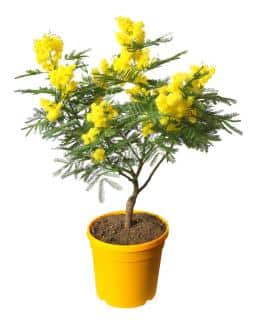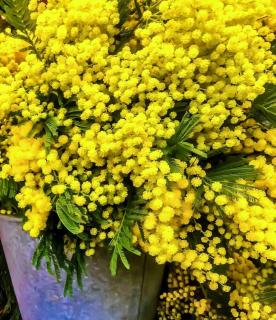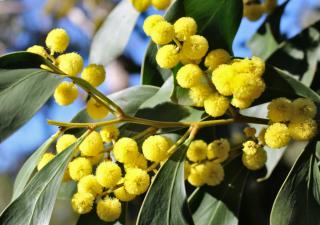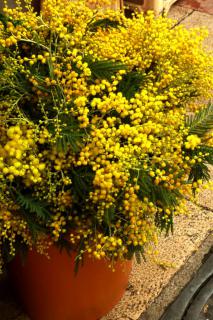

Mimosa blooms in winter with warm, yellow flowers. Grow it in a pot near a window!
Key facts for potted mimosa
Name – Acacia dealbata
Family – Mimosaceae
Type – short tree
Height – up to 9 feet (3 m), if pruned
Exposure – full sun
Soil – well drained and sandy
Foliage – evergreen – Flowering – January to March
Mimosa is a small tree that is part of the Acacia genus. Many love it thanks to its abundant blooming. Fragrant yellow puffs appear at the end of winter. Symbolic of Mediterranean regions, mimosa doesn’t cope well with cold weather, so growing it in a pot is best: you can bring it indoors in winter.
Chose your potted specimen from shorter, dwarf mimosa varieties that grow slowly. A few other key facts will ensure your potted mimosa thrives, such as the type of pot, substrate, location, care and winterizing.

Use a pot size that is about two times larger than the root ball of the mimosa. Experts say that a container about 20 to 25 inches across (40 to 50 cm) is suitable for trees up to 9 feet tall (3 meters). They can reach this height in 3-4 years.
Much better is to get your hands on a terra cotta pot without any varnish or enamel. Make sure that it has holes drilled through the bottom to avoid sitting water.
Since it doesn’t like excess water, mimosa requires well-draining substrates. It most likes light, fertile soil, and having it a little acidic is a bonus (think peat or peat substitutes).
It’s preferable to plant your mimosa in its pot in spring, anytime between March and June. Use soil mix that contains one part heath soil and one part soil mix, with a handful or two of river sand thrown in.
A thick layer of clay pebbles or gravel, about 2 inches thick (5 cm), must be strewn along the bottom.

When growing it in a pot, make sure it gets at least 4 hours of direct sunlight during the day, especially during the summer season (from April to October).
Remember that potted plants need regular watering, so make it easy to access with a watering can or hose.
Also, try to check that the spot you’ve chosen is properly sheltered from wind.
Potted mimosa needs near-constant watering with rainwater, particularly during the growth phase. This is all the more important that substrate in pots dries out much faster then soil in the ground. As you endeavor to keep the soil cool, check that you don’t overdo it: don’t give it too much water in order to not suffocate the plant’s roots.

Once the blooming is over, prune your potted mimosa by shortening branches that have bloomed by half.
After the first 3-4 years, start the “maintenance repotting” cycle. Every couple years, in spring, after the blooming, repot your mimosa. If it’s too large, at least topdress every year.
Mimosa can survive an occasional, short bout of freezing, down to around 22°F (-5°C). Depending on where you live, you’ll have to bring your potted mimosa indoors between November and March.

Bring your pot-growing mimosa back outdoors only when you’re sure it won’t freeze anymore.
If you cannot bring it indoors, do the following:
If one day you transplant your potted mimosa into the open ground, remember to protect it against freezing well. It takes at least 3 winters for the tree to harden and resist mild freezing on its own.
To learn more:
Is now a good time to prune my potted mimosa? I’m wondering since it’s fall, lots of people say it’s a good time to cut things back. It’s in a winter garden in my house.